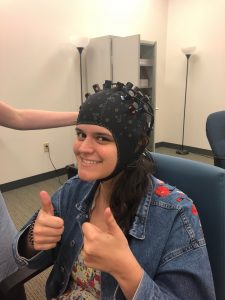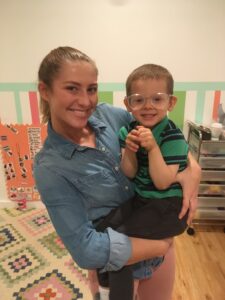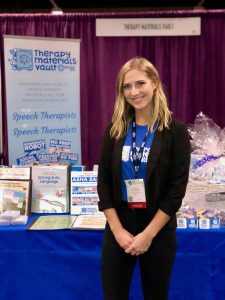Psychology Associate Professor Anastasia Dimitropoulos and Professor Sandy Russ, along with Psychology graduate student Olena Zyga published a paper titled Early Social Cognitive Ability in Preschoolers with Prader–Willi Syndrome and Autism Spectrum Disorder
Communication Sciences Assistant Professor Rachel Mulheren took an Intro to R Programming class, created content for the Pediatric Dysphagia course (new course in MA SLP program), and set up and tested lab equipment with students.
Communication Sciences MA student Nora Hassan completed her first full time externship placement as a graduate student speech language-pathology clinician. At the Cleveland Clinic Children’s Hospital for Rehabilitation, she evaluated and treated children with various communication needs in the outpatient setting. She worked closely with other therapists and different disciplines to best serve children between the ages of 2 and 12 years. While gaining clinical experience she also continued to do research work for her meta-analysis on the topic of premature infants and feeding. She calculated effect sizes for research articles that explore interventions that are used to facilitate oral feeding in premature infants. She will present on the findings of her meta-analysis in the Fall. 
Communication Sciences MA student Courtney English worked at the Chicago Speech Therapy Academy, a therapeutic preschool program. She was a teacher in a classroom with three and four year olds and provided ABA therapy to specific students. Each day, she met with a team of speech-language pathologists, occupational therapists, and Board Certified Behavioral Analysts to create a functional curriculum that targeted each students’ goals. The highlight of her summer was presenting at the ASHA Connect conference, where she introduced therapists to a website that sells accessible intervention materials that she helped design and create. (Picture used with permission from the child’s parent). 

Communication Sciences IGS MA student Shahed Eid interned for Cincinnati Children’s Hospital as a camp counselor in their Summer Treatment Program for children with ADHD. For the duration of the 7 week treatment program, she was responsible for documenting the frequency of different behaviors exhibited by her primary kids. At the end of each week, she altered the goals of her primary kids to aim for a 20% increase in positive behaviors or a 20% decrease in negative behaviors. At the end of the summer, each counselor was responsible for writing a report on their primary kids to document the progress they made regarding the social skills used and behaviors exhibited. 
Communication Sciences MA student Nina Pukys worked on a systematic review with Dr. April Yorke at Cleveland State University that studied Literacy Interventions for Individuals who use AAC for the first few weeks of summer.
Psychology Professor Julie Exline took a trip to Australia to attend a Positive Psychology conference in Melbourne. She was also able to collaborator Roy Baumeister (who lives in Brisbane).
Communication Sciences Instructor Jean Nisenboum volunteers with a special group of people who make up The Cleveland Stroke Club. In addition to the monthly meetings there were 2 special activities this summer: the summer picnic and the 45th anniversary celebration. Both events were wonderful and provide stroke patients and their families the opportunity to “get out” and party! She also had the pleasure of observing 9 of our graduate students in their off-campus clinical placements. It was exciting to see the growth that they have made after 2 semesters in our graduate program. It was particularly rewarding to hear the very positive comments the outside supervisors made about our students!
Communication Sciences MA student Maya Brown worked at a skilled nursing and outpatient rehab facility in Beachwood, Ohio. As someone who is very passionate about the geriatric population, this experience was a dream. Afterward, she worked alongside peers in her cohort to lead a one-week summer camp called FACEtime for kids and teens who stutter. At this camp, the kids had both a group to come to without judgement, and a place to openly share about their unique and shared experiences with stuttering (while also having fun and being a part of therapy the whole time, of course). If ever a “teacher” learned 10x more than the “student,” that was the time for her. She thinks she now has the improved clinical skills to show for it.


